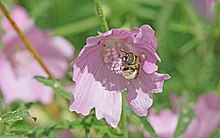Tetralonia malvae
| Tetralonia malvae | |
|---|---|

| |
| Mallow longhorn (Tetralonia malvae), Pfaffenhofen, Germany | |
| Scientific classification | |
| Domain: | Eukaryota |
| Kingdom: | Animalia |
| Phylum: | Arthropoda |
| Class: | Insecta |
| Order: | Hymenoptera |
| Family: | Apidae |
| Genus: | Tetralonia |
| Species: | T. malvae
|
| Binomial name | |
| Tetralonia malvae (Rossi, 1790)
| |
| Synonyms[1] | |
| |
Tetralonia malvae, also known as the Mallow longhorn, is a species of insect belonging to the family Apidae.[2] The bee takes pollen from oligolectic sources on the mallow family (Malvaceae).[3]
Behaviour
[edit]They generally nest on bare or sparsely overgrown ground, even to heavily sloping surfaces, or in steep walls in self-dug corridors in the earth, often in aggregations. The preferred substrate is sand, loess or loess clay. The nest consists of a corridor that can branch out. The brood cells are more or less upright and are inside with a shiny layer coated.[3] The species inhabits dry and warm locations; vineyards, fallow and ruderal areas, sand and clay pits, steep banks, from plains to the montane altitude level.[3]
Parasitism
[edit]They are parasitised by the cuckoo bee species Triepeolus tristis. Another nest parasite is a bladder-head fly of the genus Conops.[3]
Flight period
[edit]They can be seen in one generation from June to August.[3]
Distribution
[edit]The species is found from Spain, across southern and central Europe, southern Russia, Asia Minor and Caucasus to Central Asia; north to Lithuania and Orenburg; south to Sicily, Crete, Syria, Iraq and Northern Iran.[3]
References
[edit]- ^ "Tetralonia malvae". Global Biodiversity Information Facility. Retrieved 14 December 2021.
- ^ "Tetralonia malvae". Integrated Taxonomic Information System. Retrieved 10 December 2021.
- ^ a b c d e f Erwin., Scheuchl (2016). Taschenlexikon der Wildbienen Mitteleuropas : alle Arten im Porträt (in German). Quelle und Meyer. ISBN 978-3-494-01653-5. OCLC 1041414212.
